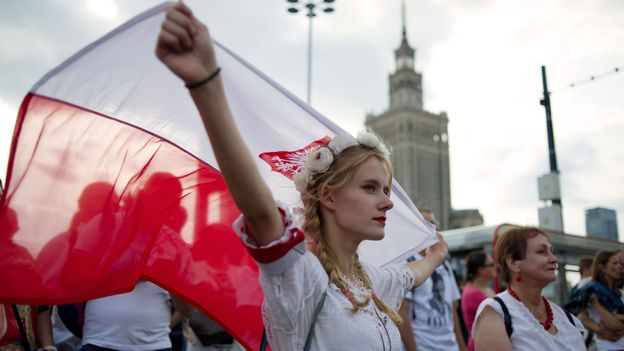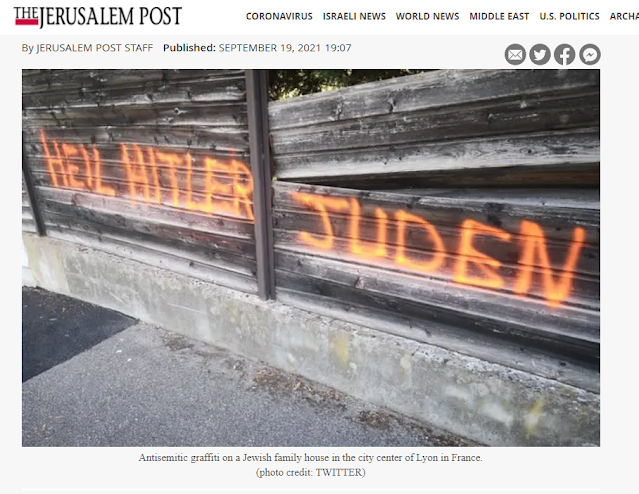 |
| Jan Maletka source |
 |
| Thank you to Lukasz Klimek for sending in this photo of the monument. |
Prof. Jan Grabowski and others object strenuously.
Grabowski insists that Poles are largely anti-Semitic criminals, and Poles have
no right to erect monuments to those who attempted to help Jews during WW II .
"Bieganski:
The Brute Polak Stereotype" is dedicated to controversies like this.
One side wants all Poles to be criminals, and it allows only stories of
criminal Poles. One side want to acknowledge Polish rescuers. That side is
demonized by the other side as being pro-Nazi.
Bieganski and this blog have always
taken the exact same stance. Name and condemn Poles who engaged in criminal
behavior during WW II. Name and honor Poles who behaved heroically. Do not
support narratives that serve hate. Advance truth.
Haaretz
reports that Jan Grabowski objects to commemorating Maletka.
Prof.
Jan Grabowski, a Polish historian and Holocaust researcher who resides and
teaches in Canada … According to Grabowski, the monument was put up to serve a
fictitious narrative, which presents the Poles as having come to the aid of
Jews in the Holocaust, in order to obscure the involvement of many more Poles
who helped the Nazis.
“They
erected a monument to celebrate Poles killed for rescuing the Jews in – of all
places – the Treblinka railway station," Grabowski said. He added that
scores of testimonies – Jewish and Polish alike – paint a different picture, in
which Poles exploited the suffering of the Jews, selling them water but not
giving it to them. "Diamonds, gold, money changed hands," he said.
"Some of these Poles have been shot by the Ukrainians guarding the
trains."
According
to Grabowski, the authorities in Poland – in this case the official in charge
of culture in the Polish government, Magdalena Gawin, and the Pilecki Institute
– acted “scandalously” in installing the monument near the camp. “I’m in shock
from the gall of those people who simply decided to write a new history of the
Holocaust by themselves," he added. In an article published in the daily
Gazeta Wyborcza, he wrote: “How easy it is for Poland to falsify stories and
commemorate a handful of fair Poles who sacrificed their lives to help Jews, in
a sea of Poles who persecuted, murdered and helped murder at least 200,000 Jews
who escaped the camps and the ghettos.” …
The
Pilecki Institute, a Polish government body tasked with research and
preservation of the history of Polish experiences in World War II and its aftermath
… claimed that the memorial was intended to commemorate a single person, rather
than a group, and that the stone was not set up near the Treblinka death camp,
but 4.5 kilometers (2.8 miles) from it. The institute also said that the
monument commemorates the Jewish victims of the camp as well.
The
monument is indeed dedicated to one person, but the Pilecki Institute website
states that Maletka did not act alone and that the railway workers in the area,
as a group, acted to help Jews. According to the Pilecki Institute, two of
Maletka's friends were also involved in the story, but their names are not
recorded in the monument, because they were not killed by the Nazis…
…
historians like Grabowski doubt the authenticity of some of [rescue] stories.
It is difficult to rely on the historical accuracy behind them, they add,
because the entities promoting them have a political agenda, which is to defend
the “good name” of the Polish nation – and not necessarily historical truth.[Of
course, accounts of Poles persecuting Jews face similar criticism.] …
The
Pilecki Institute is relying on, among other things, the testimony of one of
Maletka’s partners, Remigiusz Pawlowicz, who survived the war and told his
daughter Barbara about the incident. Barbara, who was born in 1948, was filmed
for a video distributed by the institute saying: “My father and Maletka offered
water to Jews who were coming on the train to Treblinka.” She added that her
father told her that at first the Germans were not bothered by this, but at
some point they had had enough, and began shooting at them.
Paweł
Jędrzejewski wrote in Salon 24:
The
Jewish lodge B'nai B'rith operating in Poland issued a statement in which we
read: "Polish historical policy has reached the limits of disgusting. This
time it was performed by the deputy minister of culture, Magdalena Gawin, who
unveiled in Treblinka - attention, in Treblinka! - a monument to the Poles!
saving Jews. "
In
the discussion on Facebook, Piotr Cywiński, director of the Auschwitz-Birkenau
State Museum, reacted by correcting the erroneous information given in B'nai
B'rith's statement: "1.Not in Treblinka, in the sense: in the camp, and at
the station a few kilometers away. At the same station, where a young man was
shot, who tried to give water to Jews in wagons. 3.Not a general monument to
saving Jews, but a commemoration of this event. to be omitted because the place
is inadequate.
Jedrzejewski comments:
Inciting
hatred towards Poles causes hatred towards Jews. The principle is always the
same: hostilities mutually stimulate each other, a spiral forms. Hatred takes
over and rules. And that's what manipulators are all about! They want hate
because they themselves hate. That's why they use a lie. They are victims of
these liars and their lies. Liars use them for their political ends: building
hatred towards Poles.
In
addition, all this happens just a dozen days after a professor of the
Jagiellonian University - Jan Hartman (former vice-chairman of B'nai B'rith)
published in his column on Polityka's blog such a horrendously unfair,
outrageous sentence about Poles: "It millions of people who, in the
darkness of their souls - although they will never admit it - sympathize with
the Nazis. "
Fanatic
haters, as you can see, happen on both sides. Such people are everywhere: in
all nations, ethnic groups, societies. They are inevitable. Some people shout
their shameful words full of lies in the market square in Kalisz; others on the
Polityka blog.











